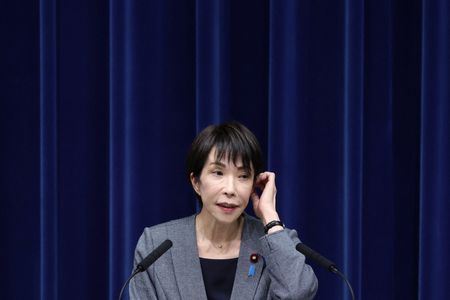By Laurie Chen and Rich McKay
BEIJING (Reuters) -Four American instructors from a small Iowa university were wounded in a stabbing attack in a public park in northeast China’s Jilin province on Monday, prompting an investigation into the attacker’s motive, Chinese officials said.
The alleged assaults occurred shortly before noon on Monday at a park in Jilin City, police said. A 55-year-old local man, identified only by his surname Cui, was detained the same day.
“Cui collided into a foreigner while walking in Beishan Park, and then stabbed the foreigner and three fellow foreigners with a knife, as well as a Chinese tourist who tried to stop him,” Jilin City police said on social media, adding the victims’ injuries were not life-threatening.
A Chinese foreign ministry spokesperson, Lin Jian, said on Tuesday that police believed it was a random attack but authorities were still investigating.
“All the injured individuals were immediately taken to the hospital and were given appropriate critical care,” Lin said.
The ministry said the incident would “not affect normal people-to-people exchanges between China and the United States” and that it would take measures to ensure the safety of foreigners in China.
U.S.
officials expressed dismay over the attack, and the State Department said it was in touch with local authorities and monitoring the situation.
“We are deeply concerned by the stabbing of U.S.
citizens in Jilin City, China,” White House National Security Advisor Jake Sullivan wrote on X on Tuesday.
“Our team has been in touch these Americans and our PRC counterparts to ensure that the victims’ needs are met, and appropriate law enforcement steps are being taken,” he said, referring to the initials for the People’s Republic of China.
“We wish them a speedy recovery.”
Officials have not released the names of the victims.
Representative Adam Zabner of the Iowa Legislature said his brother was one of the victims from Cornell College in Mount Vernon, about 15 miles east of Cedar Rapids.
“My brother, David Zabner, was wounded in the arm during a stabbing attack while visiting a temple in Jilin City, China,” he said in an interview with Reuters.
“I spoke to David… He is recovering from his injuries and doing well.
My family is incredibly grateful that David survived this attack.”
The group had been visiting a temple in Beishan Park when they were attacked by a man with a knife, he added.
“I am angered and deeply troubled by the stabbing of 3 US citizens + a non-citizen resident of Iowa in Jilin, China,” U.S.
Ambassador to China Nicholas Burns wrote on X, adding that a U.S. consular officer had visited the four in the hospital on Tuesday.
FOREIGN EXCHANGE
A video of people lying on the ground in a park covered in blood was circulating on X on Monday, apparently taken at the scene of the attack, though no trace of the images could be found on Chinese social media.
Reuters was able to identify the location of the video based on Chinese characters written on a wall, the wall’s structure and the layout of the path, but it was not able to confirm when the video was shot.
A few posts about the incident on the Chinese social media platform Weibo questioned widespread censorship of the incident in official media.
“Do they really think that censoring domestic discussion of the incident impacts whether foreigners choose to visit China or not?” posted one Weibo user.
The educators from Cornell College, which has about 1,000 students, were on a teaching exchange program with a partner university, Beihua, in Jilin City, about 600 miles (1,000 km) northeast of Beijing.
(The Iowa school is not to be confused with the much larger Cornell University in Ithaca, New York.)
The Chinese school’s website says it has 31 teaching colleges and about 24,000 students, including about 500 international students from 60 countries.
According to a 2018 news release, Cornell College’s exchange program started that year as a partnership between the Iowa school and the Chinese Ministry of Education.
The ministry provided money for Cornell instructors to live in China in exchange for teaching at Beihua University for several weeks at a time. The instructors taught computer science, mathematics and physics, the release said.
China’s President Xi Jinping this year pledged to invite 50,000 young Americans to China for study programs to boost people-to-people ties, but a State Department Level 3 travel advisory to China warning of possible arbitrary detention and exit bans remains in place.
There are currently fewer than 900 American exchange students studying in China compared to over 290,000 Chinese students in the United States, according to U.S.
data.
(Reporting by Laurie Chen and Beijing Newsroom, Gabriella Borter in Washington and Rich McKay in Atlanta; Additional reporting by Eduardo Baptista; Editing by Michael Perry and Daniel Wallis)





